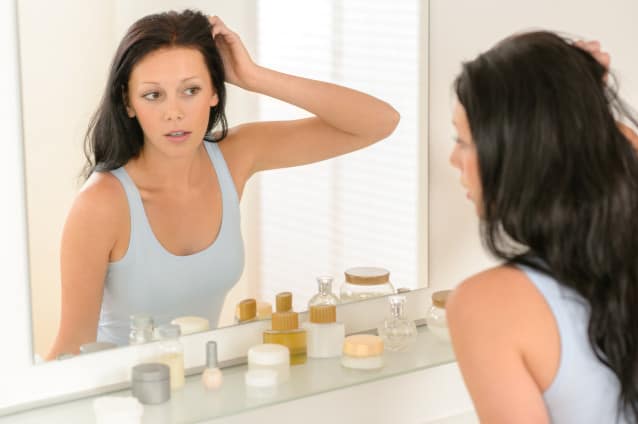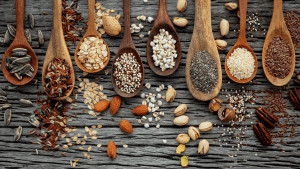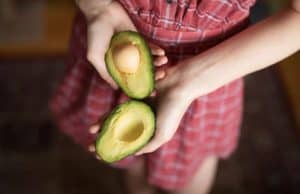Top Foods For Hair Growth: Grow Your Hair By Eating These Foods!

You are what you eat, they say. That saying has been around forever, and it basically means that what you eat becomes a part of you – quite literally. And it’s not just referring to your body, but also to your hair. In this post, we’ll be going over some of the top foods to promote hair growth. We’ll also check out their supposed attributes and qualifications to get the job done. Certain aspects are clinically proven benefits, but most require more studies before clear connections can be drawn.
If you want to witness any changes in your physical well-being and appearance, restructuring your diet is probably the number one way of facilitating that transformation naturally. What you eat (and how you eat) is reflected back to you as proper weight and a sound body.
Diet is great, but if you are having serious hair issues, consider referring to your doctor or getting to some sort of professional clinic for diagnosis. The medical sciences have come a long way in terms of diagnosis, so just to be on the safe side it is recommended to consult with a physician before implementing any serious long-term changes in your dietary habits.
Also, let’s get this one out of the way: genes and biological sex play a significant role here, as does the factor we call ‘time’. You could eat healthy amounts of all the foods on this list and still find those strands (or clumps!) of hair at the bottom of your shower. Some parts of your own nature are greater, stronger, and more dominant than others. Many times, this remains true no matter what you eat. However, a proper diet can potentially help to change your body (and your hair length) incrementally. Keep that in mind as we go through our list of foods which may promote the natural growth of hair!
10 Foods for Hair Growth
1. Eggs

Box of eggs.
Eggs are the first food on many such lists. And rightly so, since they’re one of the most common and accessible ingredients around. Humans have been consuming eggs for thousands of years. While it’s true that the method of preparation changes their constitution and values, they contain a lot of protein and biotin – the latter of which is usually singled out as a significant contributor to healthy growth of hair.
Biotin (formerly called vitamin H and other names) is a B-vitamin that has been shown to benefit the development of hair follicles. Without proper amounts of biotin, the hair could become brittle and dry. The body creates biotin spontaneously, but if you want to give it a hand then start eating some eggs. The yolk is the part you want to focus on, since it’s the most biotin-rich substance in the egg.
Eggs also contain the amino acid L-lysine, which aids in the production of the very building blocks of tissue. L-lysine is also found in the roots of the hairs themselves, and it is said to help grow and shape the hairs. There are many hair mask recipes which call for use of eggs or egg yolks, precisely for these reasons.
2. Spinach

Both raw and cooked spinach can benefit your hair.
There’s no substitute for spinach. Honestly, it’s not my favorite food, but I do make a conscious effort to add it to different things like pasta sauces or soups. It’s a fairly small addition to a larger dish which can make a world of difference. Spinach is abundant in vitamins, minerals, and iron – nutrients which are there to help your body develop in a healthier way.
Those nutrients aid in the proper growth of skin, hair, and nails. Whether raw or cooked, spinach has benefits which can be harnessed. Cooked spinach is more efficiently absorbed by the body, so there is a chance it could be better than raw for the particular task of hair growth. I suppose that once you consume the food the other parts of your body take over, and then it’s up to other factors to help the spinach achieve its goal.
Popeye the Sailor Man. He really knew what he was doing.
3. Nuts
Nuts have some of the highest concentrations of healthy fatty acids, vitamins, and minerals in the food chain. Their nutrients are quite beneficial when consumed in moderation, and they contribute to a vibrant and well-running human body. It’s amazing how small amounts of this stuff can go such a long way. Sometimes all you need is a handful of mixed nuts to provide you with relatively high percentages of nutrients you require on the daily.
In this category I am also including almonds along with nuts. Eating them raw is overall better, since some of their nutritional value might be lost during the cooking process. Fried, toasted, or otherwise cooked nuts – especially when less-healthy oils are used – can still be nutritious, but it may mean that you should consume less of them because of the possible weight-gain issue.
By the way, more studies need to be conducted on the connection between omega-3 and hair. It’s not proven that omega-3 is good for hair, but people are drawing those connections regardless of clinical studies. Whether anecdotal or hype-induced, there is a lot to say about it.
One way or another, eating nuts can enrich and enliven your scalp, which in turn may yield better hair growth. The core of a hair’s health starts at its root, followed closely by the follicle. By consuming healthy amounts of nuts and almonds, the scalp gets what it needs to grow thicker, stronger hairs.
4. Seeds

Spoons of seeds.
Some seeds are said to be more helpful than others in the hair-growth department. The seeds you are going to want to focus on are those rich in the amino acid L-lysine. Pumpkin, chia, sesame, and sunflower seeds are prime examples of beneficial seeds. Molecular biology and amino acids are not exactly my forte, to say the least. But I was always told that sesame sauce (tahini) is one of the best things to consume for general health and well-being.
But seeds such as those are not a single-use, one-hit-wonder, just-there-for-garnish kind of ingredient. No, sir. They are also considered to be good sources of healthy fats, zinc, iron, selenium, and more. But because of their high calorie count, those who are attempting to lose or maintain their weight should take the potential for weight gain into consideration, same as with the nuts and almonds.
5. Avocado

Hand holding avocado.
Avocado is yet another popular ingredient in hair masks, and also in many other hair and skin care products. This is due to its naturally high amounts of hair-healthy nutrients. Avocados are a powerhouse of omega fatty acids and vitamin E. Both of these can help the scalp repair damage to its surface. They also provide the region with an added layer of protection against future damage or attack.
The health and well-being of your scalp directly affects the strength and vitality of the hairs that grow out of it. Avocados especially, with their vitamin E content, help to rein in free radicals which may harm your cells if left unchecked. In doing so, avocados aid in maintaining the body and its ongoing state of balance.
There are so many ways to consume avocados, you seriously have no excuse to not get some it into your system! They’re chock full of antioxidants and oh so tasty with a squeeze of lemon and some tuna. And speaking of fish…
6. Oysters
I’ve never been a fan of this food, flavor-wise. Seafood in general is more of an acquired taste, in my opinion. But you can’t deny that oysters have some very desirable qualities, one of which is healthy hair growth.
Famous for their age-old use as an aphrodisiac and mood-booster, oysters got their hair-growth reputation from their high levels of zinc. Zinc is an element which helps the body repair tissue damage and grow healthier hair and skin. It’s also been linked to an increase in testosterone and to mood enhancement (hence its age-old use as a sexual stimulant).
Without proper amounts of zinc circulating in your system, hairs may grow in a sluggish manner. Or they may cease growing altogether, eventually contributing to hair breakage and loss. But wait – don’t start popping those zinc nutritional supplements quite yet! The reason oysters are on this list is because zinc intake could become problematic if you overdo it.
Oysters help you to balance things out by incorporating zinc into your normal diet, as opposed to taking a supplement on a regular basis. It’s usually better to get varying amounts through proper eating, rather than a fixed amount through supplementation. And this probably applies to many nutrients or related substances – best to get it naturally when you have the option.
7. Salmon
For years, I would only eat tuna. Tuna on toast was a real specialty of mine (lightly toasted bread, lettuce, tomatoes, light layer of mayo, tuna, a drop of olive oil, and a short squeeze of lemon – you’re welcome). But then I discovered salmon, and everything changed for me. It was a day when I knew I had “grown up” just a little bit.
Salmon is considered a very fatty fish. Its omega-3 content is one of the highest in the sea, alongside fish like mackerel, herring, tuna, and sardines. There are several other nutrients which fatty fish contain that can also aid the body, regardless of that famous fatty acid: protein, selenium, and vitamins can all help to increase the strength and life of your hair.
8. Sweet Potatoes

Sweet potatoes.
Another personal favorite. What can I say? I’m a sucker for fruits and veggies, and I’ll probably always prefer them to just about anything else on the menu. So, just how hair-friendly are sweet potatoes? Pretty friendly, it turns out.
Sweet potatoes are abundant in beta-carotene, a substance that the body converts to vitamin A. One of the jobs vitamin A is tasked with is encouraging the production of sebum. It’s a natural lubricant which greatly affects the scalp and hair, among other things. Again, a happy and healthy scalp is more likely to produce and maintain happy and healthy hair strands.
Vitamin A has been linked to faster hair growth. All kinds of tissue in the human body – like hair, nails, and skin – require this vitamin in order to grow. Hair cells are among the fastest-growing cells in our body, so getting enough vitamin A means that you will always be giving them fuel to keep on growing steadily. Conversely, a diet lacking in vitamin A may be cause for scalp/hair damage and loss of hair.
9. Yeast
Nutritional yeast and brewer’s yeast are two foods which are similar in some ways. One of the qualities they share is the ability to support the growth of healthy hair. Yeast is teeming with B vitamins. It’s a biotin-rich food, and it also ranks high in terms of folic acid content. There are different yeast-based products for preventing hair loss or increasing hair length, but consuming it through proper diet is probably the best way to absorb it. Same as with the other foods on this list.
Back in 2012 (or thereabouts), there was a sudden spike of people and memes that were concerning themselves with yeast-infection creams. The idea was this: women were using their antifungal vaginal creams directly on the hair on their heads in order to increase healthy growth. And in some cases, they had a measure of success.
I think this trend is still going on. Let’s hear it for fungi!
10. Liver
This one may be more true for women, since it has to do with iron intake (which has a way of affecting women’s hair more than it does men). Much like oysters and their zinc should be consumed in moderation in order to prevent the method from backfiring, liver works in the same way. You need to consume enough of it but not overdo it, and this is because of its iron content.
Liver also has a lot of vitamin A and protein, which can aid in your goal of promoting hair growth. Eating inner organ meat has its advantages. But if you overdo it, you could cause the method to become less efficient. Too much vitamin A can actually cause hair to fall out, and I get the feeling that most readers aren’t interested in that solution.
Just say yes to pâté! Remember what the Monty Python boys said decades ago in The Meaning of Life: “Hello, can we have your liver?”
Conclusion
Nothing on this list is a miracle worker. These are foods which can help your body prevent hair loss and encourage proper and healthy growth of hair. Chances are that if you have very dominant hair loss genes in your pool, it’s going to happen one way or another. There are no guarantees with natural methods such as these, as they are dependent on may other variables. Also, keep in mind that these foods are still being studied in regards to hair loss, hair restoration, and healthy hair growth.
These are our picks for top foods to promote hair growth. But you know better than others precisely what your body likes and dislikes, and what it reacts best to. What works for some people may not work for the others, so get to know yourself through dietary trial and error. Based on anecdotal – and some clinical – evidence, you can draw a connection between these foods and healthy, shiny, vital hair. But nothing is an absolute.
May your locks and strands grow ever longer and ever stronger!

